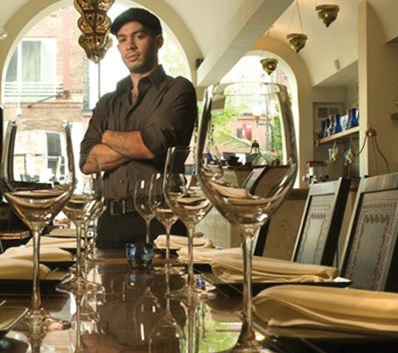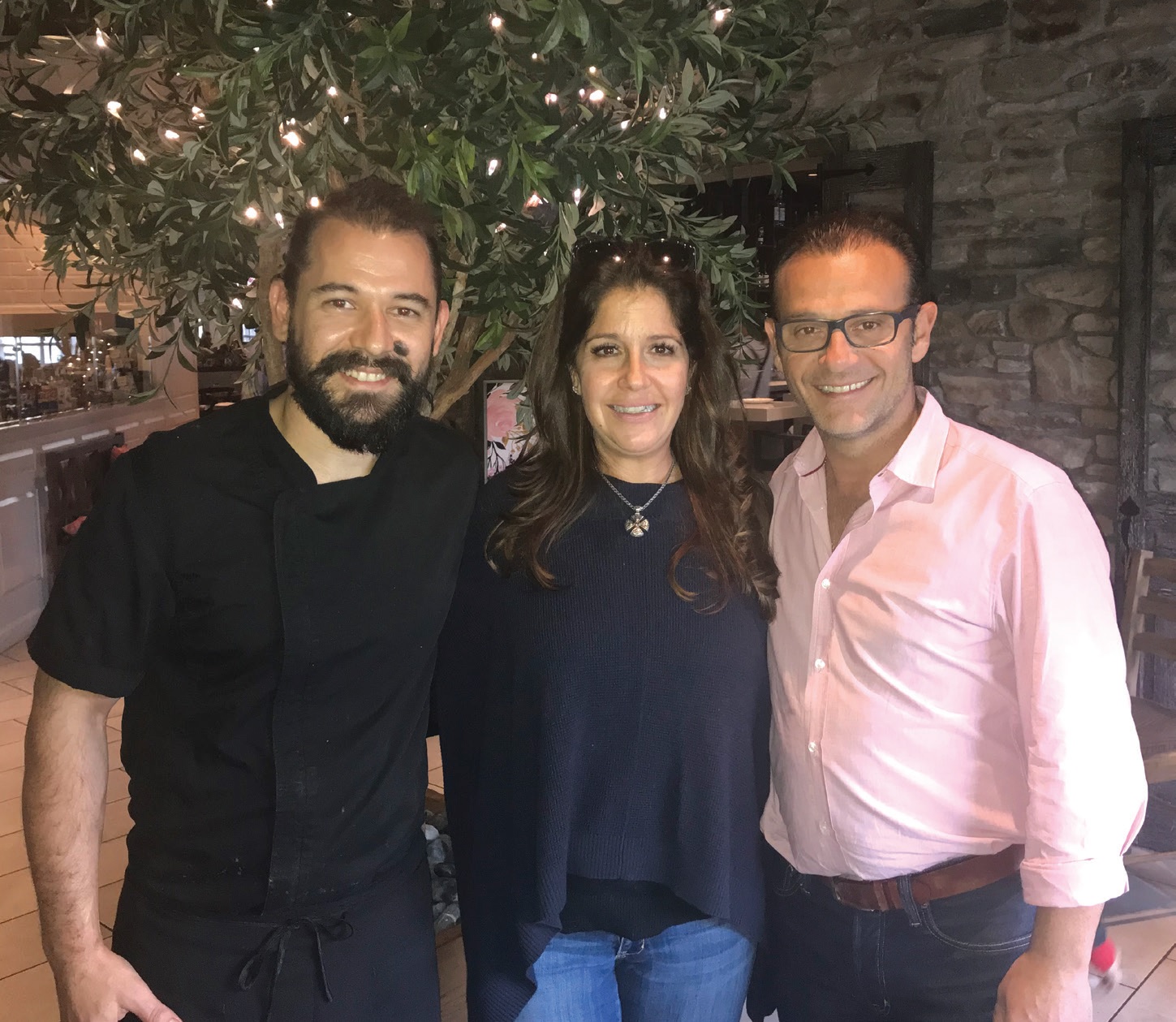The Winds of Changing Greek Cuisine
Posted by estiator at 10 March, at 10 : 09 AM Print
By CONSTANTINE N. KOLITSAS
TRADITION AND EVOLUTION ON CHICAGO’S RESTAURANT SCENE
Riding the tailwinds created by America’s love affair with Greek yogurt, the nation’s Greek restaurants are being rediscovered in a new light by diners from Bangor to Brentwood. But as most Greek Americans will concede, the city where Greek cuisine is most deeply rooted is at the midpoint between those coasts, in the nation’s Second City, Chicago.
For many non-Greeks living outside of the Windy City, the notion of a Greek restaurant in Chicago aligns with that of “Dancing Zorba”, the fictitious family establishment where the mostly fictitious Toula Portokalos toiled away her days in the legendary rom-com “My Big Fat Greek Wedding”. On our recent trip, however, Estiator found little to remind us of that mom-and-pop shop. Instead, we discovered some of the most tasty and trend-forward expressions of Greek cuisine this side of the Atlantic. And as the city’s Greek restaurant scene first defined Greek cuisine for Americans in the 60s, it continues to shape the future of the Hellenic kitchen.
The Classic Greek Taverna: It All Began in Greektown
An assignment to visit the Greek restaurants of Chicago must start on Halsted Street, at the center of the city’s Greektown, where for decades Chicagoans lined up in the cold to get a taste of Greece. Once the heart of Greek Chicago, there remain but a few Greek restaurants there today, as the area undergoes a transformation to high-rise luxury apartments and big-name corporate headquarters (McDonald’s has it’s HQ nearby and Google has a massive presence).
Gus Koutsogeorgas, owner of the storied Greek Islands restaurant, is seated at the corner of his restaurant’s bar, where he has a bird’s eye view to the main dining room and can scan across the building to the open kitchen and the second dining room adjacent. He is the last of the old guard in what was once the epicenter of trendsetting Greek dining. Gone are the Parthenon, Pegasus and, most recently, Roditys. What is not gone, however, are the lines at Greek Islands. At noontime on a Thursday in October, nearly all of its 400 seats are filled. And one after another, regular customers are interrupting, saying hello and offering unsolicited compliments. It’s not surprising to learn afterward, then, that the restaurant has ranked on the list of top independently-owned restaurants in recent years, reportedly averaging over $12 million in annual sales.

Gus Koutsogeorgas
Rising rents have chased many of his fellow restaurateurs from the area, says Koutsogeorgas, who purchased the building that houses his eatery and the adjacent parking lot in 1982, after relocating from another Greektown location that he had occupied from 1971.
Dimitris Manolakos, a young restaurant veteran at Taxim in the trendy Wicker Park neighborhood of the city, agrees. As the restaurant owners got older, and their children were faced with the option of keeping the business or accepting buyout offers, most sold out, he says. “The real estate in the area exploded,” he relays, with several walking away with up to $9 million in windfall.
A quick gaze down the street attests to those theories: Across from the Greek Islands is a luxury apartment building that has gone up where there was once a parking lot; rents there can be over $2,000 per month for a postage-stamp sized studio. Talk to any of the restaurateurs in the area, and it’s clear that Koutsogeorgas is the reigning patriarch of the Windy City’s Greek restaurant scene. While some have moved away from the traditional taverna-style eatery that his establishment embodies, all honor him for the positive impact he and Greek Islands have had on Greek cuisine.
Koutsogeorgas started Greek Islands nearly 50 years ago, in 1971. With a watchful eye, and a commitment to quality, he has made it a destination for the grey suit crowd, Greek food aficionados, and the metropolitan area’s ethnic Greek population – so much so that it’s impossible to visit without hearing at least a handful of customers placing their orders in Greek.
“Every year we do an Anastasi dinner”, says Koutsogeorgas, indicating that the restaurant fills up with his fellow countrymen after midnight on Holy Saturday to break the Lenten fast, a testament to his restaurant’s vaunted status and to its quality.
Although considered one of, if not “the” best traditional taverna-style restaurants in the country (and certainly the busiest), Koutsogeorgas is not content to sit on his laurels. Every year he travels back to Greece to seek out new recipes, as well as the finest Greek products to bring to his kitchen.
“We import over 45 tons of olive oil,” he says, indicating the amount used each year between his Halsted Street landmark and a second location in Lombard. “We only cook with olive oil,” he says, adding that, in addition to olive producers, he has personal relationships with Greek winemakers, including one that produces wines to his specifications for bottles that bear his name. “We are extremely serious about quality here,” he says. “We don’t buy frozen New Zealand or Australian lamb, we buy lamb from Colorado, which we believe is the very best.” He also makes his own yogurt in-house, as well as his own gyros and, of course, traditional Greek sweets.
“We cook healthy, wholesome food,” he says, indicating that he did away with chicken bases and ingredients that contain MSG over thirty years ago. Smiling, he rises again to greet another customer who is walking across the restaurant to say hello. “He has been coming to Greek Islands since the year we opened,” Koutsogeorgas says as the customer walks away. No doubt, he is just one of thousands.
Breaking Bread Is Just the Beginning
Its name means “City of Bread”, and, indeed, it is bread that is at the soul of Artopolis, a trendy European style cafeteria just a few blocks down Halsted from Greek Islands. But bread is just the beginning: Artopolis is a bakery, a coffee bar, a pastry shop, a fast-casual sandwich/salad spot, a table-service restaurant, an off-premise caterer and a bar. Oh, and did we say a marketplace? If the description sounds confusing and hodgepodge, the eatery is nothing of the sort. One aspect of the concept flows organically into the other, and it all makes perfectly wonderful sense. “We didn’t invent the concept,” says Maria Melidis, perhaps one of the warmest and loveliest restaurateurs we’ve come across. “This concept is something that we lived in Greece. It may be new to the United States,” she says, “but in Greece, it’s a way of life”.

Maria Melidis
The idea of snacking or sitting at a “cafeteria” for three hours is a European tradition, she says. And when she first opened, there was no Starbucks trying to mimic the concept. In any case, Artopolis is far more than a Starbucks – it’s got serious food made by serious chefs, serious coffees made by serious baristas, and serious baked good made by serious bakers; all done with passion and reverence for the art of food.
Looking around at the crowd, Melidis seems to be on to something: At the window that looks onto Halsted Street, a young couple lounges over a frappe and a snack of savory cheese pie from the “Artopita” section of the menu, while another pair just a few tables away is enjoying a late lunch (his, a serving of oven braised beef with orzo and hers a salad of spinach, pine nuts and goat cheese). All the while there is a continuous line at the bakery counter and a man in a business suit is browsing through the agora’s selection of fine Greek wines to bring home.
Artopolis opened in December of 1999, promising a food experience for the new millennium, and has delivered on its promise.
“People in the United States eat differently than they did in previous generations,” says Melidis, alluding to the need for quick service and the desire for healthy foods that embrace global flavors. At the same time, the restaurant represents the Greece of the new millennium, with a bright, open design that invites visitors to explore all aspects of the operation.
Artopolis offers table service from 4pm to midnight Monday through Friday and all day on Saturday and Sunday. It opens for breakfast at 8:30 daily and on weekday lunches operates much like a fast casual concept, with counter service. A large U-shaped bar attracts coffee lovers and serves beer, wine and spirits. Two catering vans with the restaurant logo wrapped around its frame run through the Chicago streets continuously through the lunch hour, bringing platters of sandwiches, bowls of salad and stacks of fresh baked heaven to offices in the area. “We are almost completely booked for the Christmas season,” she says.
Melidis, who came to the United States in 1986, represents the past, present and future of Greek cuisine in Chicago. Her first venture with her husband and brother was a fast food gyro shop which enabled them to save and open, in 1990, Pegasus, one of Halsted Street’s destination restaurants. With the success of Pegasus, Melidis opened a place in the suburbs that was a forerunner of Artopolis. Her next step, she says, is a satellite operation at the airport, where visitors to Chicago can experience the welcoming embrace of a delicious Greek bite and frappe as soon as they land.
Uptown Funk
Heading out of the center of Chicago, uptown to the West Town section of the city, we came across Six06 Café Bar, another Greek eatery that is inspired by the cafes of contemporary Greece. Part Psirri, part Brooklyn, this inventive destination is a visual feast, packed with fascinating artifacts that are a call-out to modern Greek pop culture. The menu, it so happens, has a similar affect on the palate.

Panos Panagakis
Here, Chef Dimitris Dib churns out such offerings as tsoureki French toast drizzled with caramel and chocolate sauces; a burger made from a kefte patty stuffed with gouda and topped with carmelized onions and feta sauce; and a crepe filled with Greek custard, cinnamon caramel apples and candied pecans. But not everything falls into his category of “twisted Greek” cuisine; the menu has more than just a few staples (among them, grilled octopus, pork souvlaki and an assortment of dips) as well as some great-but-not-soubiquitous dishes such as kayianas (scrambled eggs with diced fresh tomato and feta) and soutzoukakia (Smyrna-style meatballs spiked with Eastern spices and gently bathed in a savory tomato sauce).
“Our concept was to create a café with culture,” says Panos Panagakis, who, together with his brother George, opened Six06 (named for the first three digits of all Chicago zip codes) in February 2018. The response, so far, has been overwhelmingly positive, with the place’s breakfast getting great notice.
“Breakfast was not something that I was familiar with,” says Dib, a Pireaus native who has spent most of his career as the private chef to three Saudi kings. Unfamiliar, however, does not mean less than spectacular. So spectacular, in fact, that local web sensation Ina Pinkney, the self-proclaimed “Breakfast Queen of Chicago” proclaimed her morning meal there among the best that the city offers.
Aesthetically, the space is a funky mix of coffee house and hipster bar, with exposed brick walls standing upon an apoxy-covered cement floor. Layers of street posters, mostly from Greece and many sporting the greenand-white of Panagakis’s beloved Panathinaikos soccer team, make an urban statement. A “michanaki” parked at a meter outside of the place’s restrooms is a further nod to Greek urban culture. “It’s all about the vibe,” says Panagakis, who also owns a family eatery on the outskirts of the city that he and his brother inherited from their recently-deceased father. “It all ties together,” he says of the new venture, “the food, the feel of the space, the coffees.”

Chef Dimitris Dib
And then there’s the music. Most nights, Six06 is transformed into a hot spot, with a DJ spinning Chicago “house” music on some occasions, and with a live band playing Greek rebetika on others. “We have Greek nights at least once a month,” says Panos, a thirtysomething Chicago native. “We have some great musicians that come and play and the place fills up.” So much so that the next event is already booked.
Asked if the space’s in-your-face aesthetic is a turn-off for the yiayia-and-pappou crowd, he laughs. “Well, we have plenty of older Greeks that come here and love it. But it is usually their children or grandchildren that get them through the doors for their first visit.”
The brothers are currently crowning the space with a rooftop patio that is in the final phases of construction and will be ready for patrons after the winter.
Bride of the West, Mistress of the East
As political writer Robert Kaplan wrote of Greece in his book “Balkan Ghosts”, Greece’s geography, culture and attitudes are a mix of East and West. “Bride of the West, Mistress of the East” is the name he gives to the book’s chapter on the country, and at Taxim his theory is validated from a culinary perspective.

David Nikolaos Schneider
Opened in 2009, Taxim is dedicated to serving regional dishes from throughout Greece, most often authentically, and at times, with creative interpretations. The creation of chef/owner David Nikolaos Schneider, Taxim draws inspiration from his extensive travels throughout Greece and the Levant. When we visited, in fact, Schneider was on one of his frequent trips to his mother’s home island of Evvia, leaving us in the very capable hands of veteran staffer Dimitris Manolakos, who has been with Taxim since its doors first opened.
“David set out to do something very different in Greek cuisine,” says Manolakos, indicating that the restaurants in Greektown, for better or worse, all had similar menus. “For the most part, all of the chefs that opened restaurants in Chicago were from the same part of Greece, and all of the food had similar characteristics and flavor profiles that reflected their roots. Here at Taxim, David has embraced flavors and styles that are not typical to the Peloponnese – he wanted to serve food that you would find on the Aegean islands, for example, and food inspired from the Greek populations that came from Asia Minor.”
By mining this rich vein within the traditions of the Greek kitchen, Schneider has exposed Chicagoans to culinary treasures that are underrepresented in the United States, he adds. A gaze through the menu (which changes frequently) substantiates that claim: bamies laderes (okra in olive oil), prasopita (pita stuffed with leeks and goat cheese), lountza (Cypriot-style smoked pork), kokoretsi, lago stifado (rabbit stew) and even vlita (a wild bitter green) alert the diner to the chef’s culinary point of view.
But if this sounds like a menu stifled in regional tradition, then glance at it again. Creative dishes such as spit-roasted duck gyro and wood grilled shrimp wrapped in grape leaves with hot pepper herald a culinary curiosity and ability that are anything but stifling or common.
At the heart of everything David does is a commitment to freshness and integrity of ingredients, says Manolakos. “Our sea bass is flown in, and we use only free range birds,” he says, adding that the restaurant’s pitas, breads and phyllo are all made on premises.
Schneider’s passion for travel informs not just his restaurant’s eclectic menu, but it’s décor as well, which, says Manolakos, he designed largely himself from artifacts he brought from abroad. Byzantine artwork adorns its exposed brick walls, a stunning metal chandelier from Syria hangs from its twenty-foot white ceiling, and a wonderful trio of Middle Eastern oversized copper serving trays grace its back wall.
And as if the food and the environs weren’t enough to lull visitors into the illusion that they’ve stepped into another world, the wines will surely do the trick. Over one hundred selections grace the eatery’s Greek-only wine list, with gems that are difficult to find in Athenian eateries, let alone a stateside restaurant.
Mediterranean Cuisine, Reimagined
What do you get when you take a Greek-American fourth-generation restaurateur, send him to culinary school at Johnson & Wales, give him post-grad training under Mario Batali and David Pasternak, anoint him with a James Beard Foundation Rising Star award, and set him loose in a tucked-away space on Chicago’s Magnificent Mile? The Purple Pig.
Jimmy Bannos Jr, scion of the family that has for decades owned and operated the city’s legendary Heaven on Seven and its auxiliaries, burst onto the Chicago culinary scene nine years ago with this curiously titled one-room eatery that manages to produce food for approximately 9001,000 guests per night. Every night. And we’re not talking about average food here – we’re talking cutting edge culinary art; food as poetry, if you will.
Bannos, whose connection to Greek culture and food runs through his father’s side of the family, speaks proudly of the culinary legacy that has been handed to him.
“My great grandmother ran a busy restaurant during the depression,” he says. “Her brothers had a restaurant in Logan Square and when they were deported back to Greece, she took over their business.”
His great grandfather, a fruit peddler, helped her. His grandfather, also a restaurateur, helped his father to establish Heaven on Seven; a restaurant that served up cutting edge “N’Awlins” cuisine to the Chicago elite. Jimmy Jr. grew up in that restaurant, bussing tables, peeling potatoes and learning his chops (literally) under his father’s tutelage. Once out of the house, however, he chose a different path – rather than walking into the family business, he sought out some of the country’s best chefs to broaden his awareness, hone his skills, and learn, learn, learn.

Jimmy Bannos Jr.
“My father would have supported any direction that I decided to take,” Bannos says, indicating that his father’s relationships in the business helped him to connect with some A-list chefs. “I worked with some great chefs from the time I was 18, 21 years old,” he says. “But the deal was he could only get me through the door; that I would have to prove myself every day. And because of my father’s relationships I had a target on my back in every kitchen I worked. It made me tougher, and inspired me to work harder.”
Inspired he was. The Purple Pig, which serves “Michelin quality food at Cheesecake Factory numbers”, according to Bannos, is a culinary marvel that attracts foodies from throughout the country, and well beyond.
On the Saturday we visited, the hour was approaching 9pm and people arriving for dinner were told it would be over two and a half hours for a seat, including a seat on the patio where heaters and removable vinyl panels kept out most of the cool October air. Inside the restaurant, diners were seated at the Pig’s communal tables and along a counter that offered a bird’s eye view of the goings on of the restaurant’s open kitchen. Jimmy was at the expo line, calling out directions to a staff of ten line cooks that hustled and presented plates with speed, precision and passion.
The restaurant’s menu changes daily and on the night we visited, it included some phenomenal Mediterranean-inspired dishes such as housemade Greek sausage served with peaches and smoked peppers; chicken thigh kebabs with fried smashed potatoes and tzatziki; and whipped feta arranged between sheets of date cracker and topped with saffron-pickled leeks and snow peas. During the summer months, he says, the menu has even more of a Greek nod as the season is the ideal time to enjoy Greek food, with its seafood offerings and fresh produce.
“We focus on the next level of Mediterranean cuisine,” says Bannos, indicating that he and his cooking staff apply the region’s culinary fundamentals and techniques to the dishes they present. And while he loves to go to Greektown for a good authentic Greek meal, he has no interest in serving the tried and true. “My favorite thing to do,” he says, “is to cook classic Greek dishes and then try to elevate them a bit.”
“Every dish that we prepare has to be ours,” he says. “I don’t want to serve food that people have seen before; it’s got to have our unique signature.”
And as the restaurant’s name suggests, there’s lots of pig to go around: pork spare ribs with amaro BBQ sauce and farro; milk-braised pork shoulder with mashed potatoes and crispy lentils; pork cheek served alongside quail breast and chicken liver; and even a paella of pheasant and pigs feet. Finally, all of the fifteen or so charcuterie meats – from the pancetta to the guanciale – are cured in house.
Earlier this year, Bannos took on a new challenge with the opening of Piggie Small’s Gyro Shop, a fast casual concept that offers hand-crafted Greek street food to foodies at the Wells Street food hall in downtown Chicago. If his success streak continues, we can expect to see more of Jimmy’s magic in many places around the country.
At Once, Classic and New
If contemporary Greeks are a people that respect and love their traditions while embracing all (quality) things new and exciting, Plateia Mediterranean Kitchen & Bar in Chicago’s Glenview suburb is the restaurantification of those people.
Located along the freeway that connects O’Hare Airport to the city, Plateia, owned by Petros and Agatha Papadatos and Dimitris Douvlis, is a perfectly-executed next generation taverna, devoid of kitschy island seascapes and marbled ancestors. With the exception of gyros, diners will find all of the usual suspects of the Greek kitchen – char-grilled meats, fresh bronzino, roast lamb, pastitsio and what was likely the finest moussaka since some ancient ancestor spilled bechamel on a neighbor’s roasted eggplant (“you’ve got peanut butter on my chocolate!”).

Chef Marios Kalambogias, Agatha and Petros Papadatos.
Chef Marios Kalampogias who was recently elevated to a partner, has been with Plateia since its inception three years ago. Hailing from the island of Ikaria, one of five “blue zone” regions where people live longer and healthier than anywhere on the planet, Mario is a culinary school graduate that has (among others) helmed the kitchen at the five-star Athens Hilton.
His plates give away his culinary pedigree: a horiatiki salad is presented vertically, begging amateur food critics to immediately post its picture to Facebook; kolokythokeftedhes are exquisitely spiced, with a crisp skin and soft, sumptuous center; and lamb chops are grilled to perfection, their aroma wafting from the next table like the livani from a thymiato ascending to heaven.
“This is the Greece of today,” says Agatha Papadatos, a lively spirit that her husband introduces as “our PR and marketing goddess”.
Looking across the spacious room with its walls of reclaimed wood and stone, tile floors and pillow-backed banquettes, it’s easy to understand her point. The design is classy yet comfortable; earthy yet ethereal. To punctuate the point of the concept, the main dining room has a tree at its center, recalling Greece’s village squares that are the focal point of a community’s social interaction.
“With Plateia we wanted to recreate that ‘piatsa’ or village square aesthetic that is so central to the Greek way of life,” says Petros.
Around the room families shared plates of fragrant grilled meats, young couples stared starry-eyed over lush plates of tarama and skordalia (better drop a breath mint before you lean in for that kiss, fella), and businessmen cut deals over long tender octopus tentacles, doused in a vibrant ladolemono.
“Greece had over 30 million visitors this year,” says Agatha. “People are returning from their vacations looking to find restaurants like the ones they visited in Mykonos, Santorini, or in the trendy neighborhoods of Athens,” she adds, arguing that the old concept of a Greek restaurant from the 70s bears little connection to their expectations.
When they first opened, they had many Greeks that came and looked and offered their condolences, says Agatha. “They couldn’t understand how we expected to succeed without gyro, without the blue-andwhite, without setting our saganaki on fire,” she said. Now, however, they understand, and they come in droves, along with the local suburbanites and the travelers.
“We have a woman from Connecticut that flies into Chicago frequently and insists she cannot come to the city without stopping at Plateia first,” she says proudly. And when they come, they come in big numbers. Last year Plateia hosted over 300 parties, proving again that the restaurant’s anointed name is more than just a pretty-sounding Greek word.
















